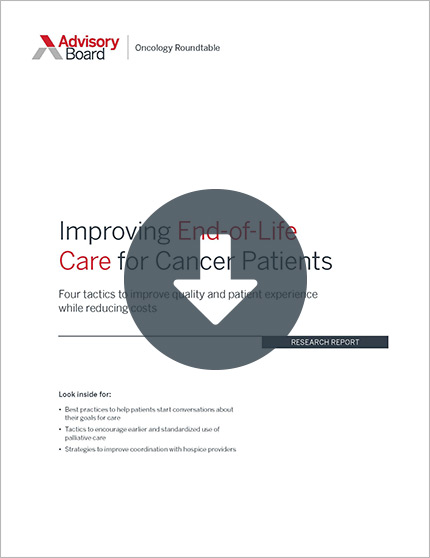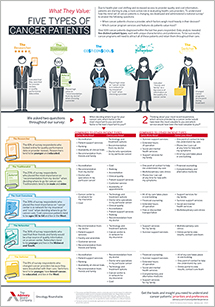Auto logout in seconds.
Continue LogoutSocial media has given life to a range of pseudoscience videos that scientists warn can cause patients real harm—but one group of scientists has taken a page from the pseudoscience handbook and is pushing back with a "trojan horse" video that aims to encourage viewers to think more critically when they encounter misinformation online, Brian Barrett reports for WIRED.
What they value: The 5 types of cancer patients
The inspiration behind the video
Johnathan Jarry, a science communicator at McGill University's Office for Science and Society (OSS), and his colleagues regularly combat baseless science claims through a variety of content, such as videos, writings, and interviews, under the tagline "Separating Sense from Nonsense," according to WIRED. The YouTube videos Jarry's team produces typically generate about 700 views. So when a pseudoscience science video touting an 84-year old cure for cancer went viral, Jarry and his team took note.
The video, which was posted on a Facebook account called "Let's Beat Cancer," has garnered more than six million views, Jarry said, which "was particularly exasperating" because the video "was one of many such videos that espouse [a] conspiracy mindset." But while the video "is rife with inaccuracies and omissions," Jarry noted that it is "easily digestible."
Jarry said he and his colleagues "could combat videos like these with long articles denouncing the falsehoods and replacing them with actual science," but said "virality often shies away from written pieces." With that in mind, Jarry decided to make "a subversive video instead"—a "type of Trojan horse," he said. It took him a day to make his own viral video.
McGill takes aim at baseless science
The McGill OSS video, titled "This NATURAL TRICK can CURE YOUR CANCER," uses a similar premise and font as the video posted by "Let's Beat Cancer."
The McGill OSS video starts by claiming that a cure for cancer was discovered by a scientist named Johan R. Tarjany in the 1800s. The video briefly explains the Tarjany discovered a molecule in a species of moss called Funariidae karkinolytae in 1816 that can cure cancer by "selectively alter[ing] the double helix of cancer cell DNA."
But after drawing the viewer in, the video's messaging changes: the video states, "There is no Dr. Tarjany"; the name is simply an anagram of Jonathan Jarry.
The video then draws attention to other inconsistencies and inaccuracies the viewer just observed: The video used photographs of two separate men to represent the fictional Tarjany and it clarifies the double helix shape of DNA was not discovered until 1953—making the fictional Tarjany's discovery in the 1800s impossible.
"All of these clues were there to show just how easy it is to make unsubstantiated claims, and just lie in a video like this, and a lot of people aren't going to notice it," Jarry said. "It's very easy to fall for these lies if you're not paying attention."
The video ends with the message: "Be skeptical. Ask questions."
To test the viral theory, Jarry asked prominent experts—Susan Gerbic, founder of the Guerilla Skepticism on Wikipedia project; David Gorski, a surgical oncologist and outspoken critic of alternative medicine and the anti-vaccination movement; Scott Rogowsky, an HQ Trivia host; and Kavin Senapathy, a science writer—to share the McGill OSS video from their Facebook and Twitter accounts on June 30.
The video garnered more than 1.7 million views from Senapathy's Facebook page alone and received more than 1,000 retweets from Rogowsky's Twitter. Once McGill OSS officially published the video, it received 3.1 million views in under a week.
Discussion
Senapathy said, "I think the McGill video worked because it mimics misleading and predatory health claim videos, down to the mediocre production values and the fonts, because it's short and easy to watch, and the twist at the end catches viewers off guard."
The video has drawn some criticism, WIRED reports. One commenter wrote, "People who have cancer, and their families, need hope. They need to know that they're doing everything they can, even if it means adding a silly algae to their diet. This approach is insensitive, tone deaf, and unnecessary to make your point about people needing to be more critical."
However, Jarry argued that misleading videos pose a significant threat to patients and steps must be done to make sure people are on alert. "I think there's genuine harm that can be done with videos that purport to claim that there is a cancer cure and that big pharma is hiding it from you," Jarry said. "You've giving people unfounded hope. The harm can be financial. The harm can be side effects that somebody doesn't need to go through, because there's no benefit at the end of it" (Barrett, WIRED, 7/10; Jarry, McGill Office for Science and Society, 7/4; McGill video, accessed 7/11).
What they value: 5 types of cancer patients
Cancer patients have more choices for their care than ever before. To attract patients in this fiercely competitive landscape, you must invest your limited resources in the right services—ones that will earn patients' trust and improve their experience.
Our infographic is your guide to understanding the five types of patients and what they value in a cancer provider.
Don't miss out on the latest Advisory Board insights
Create your free account to access 1 resource, including the latest research and webinars.
Want access without creating an account?
You have 1 free members-only resource remaining this month.
1 free members-only resources remaining
1 free members-only resources remaining
You've reached your limit of free insights
Become a member to access all of Advisory Board's resources, events, and experts
Never miss out on the latest innovative health care content tailored to you.
Benefits include:
You've reached your limit of free insights
Become a member to access all of Advisory Board's resources, events, and experts
Never miss out on the latest innovative health care content tailored to you.
Benefits include:
This content is available through your Curated Research partnership with Advisory Board. Click on ‘view this resource’ to read the full piece
Email ask@advisory.com to learn more
Click on ‘Become a Member’ to learn about the benefits of a Full-Access partnership with Advisory Board
Never miss out on the latest innovative health care content tailored to you.
Benefits Include:
This is for members only. Learn more.
Click on ‘Become a Member’ to learn about the benefits of a Full-Access partnership with Advisory Board
Never miss out on the latest innovative health care content tailored to you.


